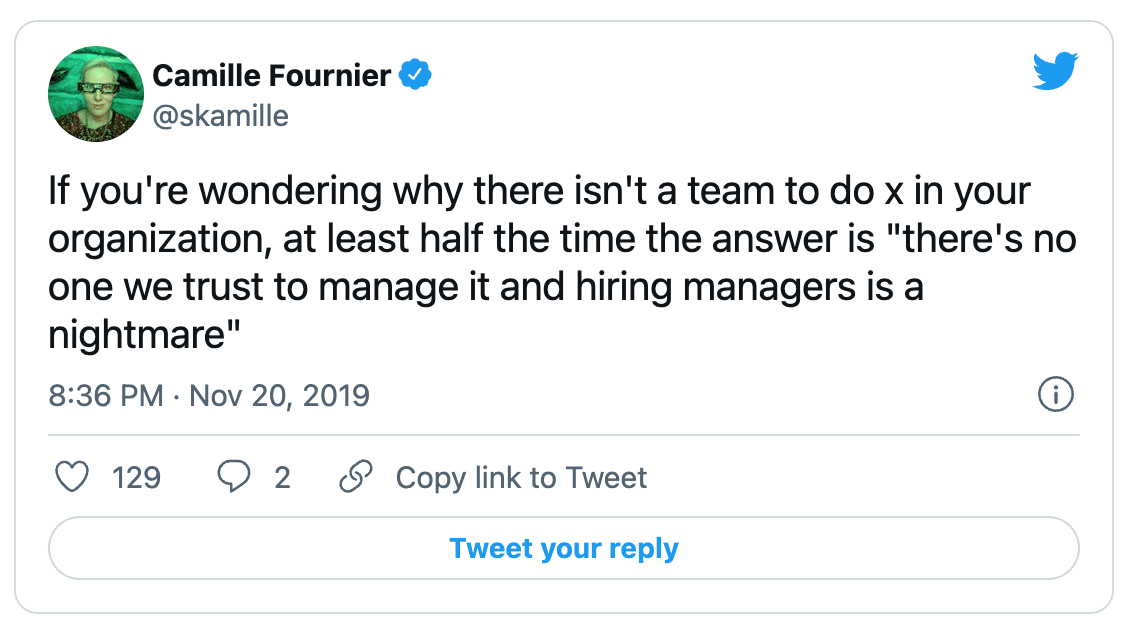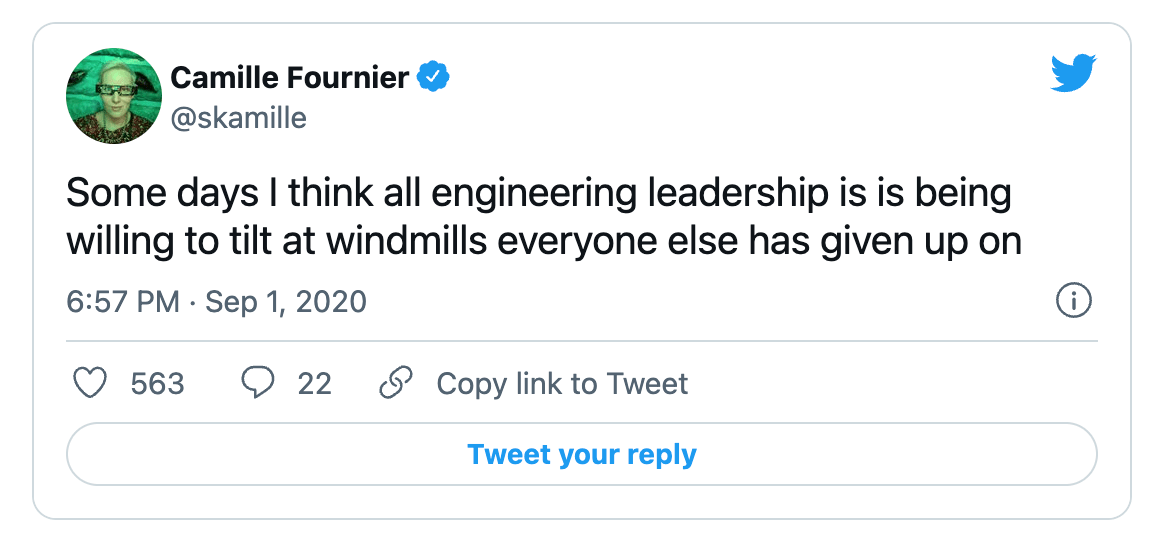Learning from a hyper growth startup
I was the first engineer and 3rd employee at a company that grew from a problem statement to a team of over 550 people with a 1.3b valuation in 3 years. Over that time, I moved from being the only engineer to managing managers and leading a team of ~22. What did I learn?
It surprised me how challenging it was to stay myself amid the pressures of hyper-growth. Today, I'm “battle hardened” and want to share some lessons in trying to be my best self in that chaotic environment. I learned about the power of strong relationships with teammates and how to ask good questions to diagnose problems across teams. But, first and critically, managing yourself.
These insights are difficult to deliver in a narrative and so I've split this post into a couple sections.

Staying in your manager mindset
Few individual tasks as a manager are difficult on their own. But, there are just so darn many things to focus on and you need to save your energy for those tasks that carry a heavy burden.
Managers are humans put in a position of power and they are often confused about how to use that power [ref]. Teammates, also humans!, are frustrated by issues at the company affecting their happiness such as career growth and money. They are unsure how to direct those frustrations and so they direct them toward their manager. Solving structural issues takes quarters to years, time the direct reports don't have. As a result, the manager ends up spending much of their energy setting expectations and managing frustrations. This leaves little energy for the things they expected to do like fixing the systemic issues or leading big initiatives.
For me, the dissidence between what I wanted to do and what I was actually doing made it hard to fully focus on the task at hand. The emotional and personal difficulties were real. I remember a low point where I hadn't slept for a few days and drank half a bottle of NyQuil. Still sleepless, I went to the gym for an hour and then continued on for a full day of work. Regular workouts and peer networks like https://orbital.nyc/ were helpful in recovery.
I imagined 'management' as a series of deliberate actions toward accomplishing 'big things' and that is what I wanted to do. In reality, the tail wags the dog. Management is often a reactive practice and big decisions are highly emotional. At a high growth company like Cityblock Health (in year 2, the staff grew from ~20 to ~140), management is behind and emotions are high.
A few critical that helped me stay in the manager mindset:
- Align your expectations with reality. Expect change [ref].
- Confront failure and performance issues head on.
- Manage your energy. Do not work if you don't have the energy. You can't revert management mistakes.
- Sleep. The mess will be there tomorrow, but so will you.
💣 Confront failure
Clearly state if you can or cannot do something and help others do the same.
Talking about failure is emotionally challenging for achievement driven individuals (really anyone tbh). But, it gets easier once you realize everyone is a failure. Failure is the water we are all swimming in. We make tradeoffs and every tradeoff fails someone somewhere - find out where and plan for it or talk to them about it.
I tried to fail the absolute minimum number of people and it took a costly toll (‘ruinous empathy’). I arrived at middle of the road solutions that left everyone a little miffed.
Now, rather than treating tradeoffs as a harm mitigation problem, I double down in the places that are working to maximize success. Success isn’t trying to win every battle but setting expectations early about which battles you expect to win and telling people. I like to say that 'we are always failing but never a failure'.
Later in the post, I talk about goals. Getting your direct reports comfortable talking about their near term goals and helping them handle not meeting them is critical. If you embody the practice of talking about your goals and failures in team settings, those same conversations with your direct reports become easier.
🍃 Energy conservation
I thought that when people encounter a difficult problem, they would read, research and discuss how best to solve the problem. However, most of the time, you have 3 minutes in a meeting and have to move on.
Small quick wins made day over day are how you make something great. Managing your energy so you can fully engage during those 3 min is critical.
A strong ‘manager of managers’ can have a large impact out of a small bit of energy. This requires being able to quickly map prior experiences into new problems. For me, part of writing this (and other posts) is to ensure many of these lessons really stick, so that I can retrieve them in a 'low energy' way in the future.

"I have yet to see any problem, however complicated, which, when you looked at it in the right way, did not become still more complicated." [ref]
Helping the team
Long ago, I learned that my job as a manager is to help other people get 'the right work' done. I've tried many ways to get the right people together, and adjusted meeting cadences and approval processes to get the team the information and business drivers they need. But, it left me with the question, was anything working?
A big part of managing across many teams is being able to quickly inspect long lived projects and personal dynamics within those projects. With the right information, the solution is often the easy part. However, getting accurate information is both so easy and so agonizingly hard at the same time.
Understanding the team and active projects requires asking uncomfortably dumb or basic questions. Ideally ask as someone who genuinely wants to help (building trust and psychological safety are key) instead of a leadership interrogator that prompts defensive, or inaccurate response. It also requires being annoying about ensuring work is tied to the business and that any tech investments are strategic and not 'promotion driven' [ref].
As for what to ask, I really like using these these factors effective collaboration from @Camille Fournier to sanity check teams and projects:
- Are you talking to one another effectively?
- Do you know where you are going?
- Do you know how you are getting there?
- Do you know how to tell of you are getting there?
- Have you done the work to make sure your team can actually get work done?
⚽️ Gooooooooooooooaaaaaals
Toward getting a higher level view of what is going on, many companies set goals. Until recently, I had never been a part of an organization with a focus on formal goals. Companies I joined were more focused on delivering x thing by y date. Goals are more nuanced.
The process I recommend is to spend a few minutes in 1:1s writing 2-3 things you plan to accomplish in the next 30 days. Start by ‘working backwards’ from the impact of the work. This means asking 'what do you want the impact to the project to be and how will you have felt that impact?'. Set the impact as the deliverable rather than delivery of the feature, and agree on a date. After a couple of impact driven meetings you can introduce the SMART process where you see if each goal is:
- Specific – target a specific area for improvement.
- Measurable – quantify or at least suggest an indicator of progress.
- Achievable – possible to do in the time
- Realistic – state what results can realistically be achieved, given available resources.
- Time-related – specify when the result(s) can be achieved.
I prefer to keep it a bit informal, and just mentally reference the SMART methodology in helping team members set ambitious but achievable goals.
Though my team members and I often didn't meet our goals, this process improved our ability to anticipate obstacles and enabled us to prioritize projects to eliminate those obstacles. Lastly, we get quick performance feedback and can quickly deliver that feedback to team members.

Is that all there is?
Not really, but life is short. I'd love to write more on managing up but I haven't been able to generalize effectively yet and problems seem very personality driven and case-by-case so far.
References
🧘 My personal practices
- Develop a hobby or personal practice to totally disconnected from work.
- Build a network of peers you can call for advice (and who you support in turn). [ref]
- Find memorable principals to ground you.
- Expect to get pushed around A LOT. That is normal. Practice pushing back by listening and asking questions, not by being negative or defeatist.
- Read some management books but expect reality to be messier than fiction. Ask peers at your company rather than the internet. It will help you better understand their leadership style.
- Build psychological safety and hold space for venting, but then guide teammates toward action [ref]
- Dig for things that make you happy and satisfied with your work.
- Leadership is a real story that brings people along. Validating your team members experiences, being vulnerable and transparent is valuable but it is not leadership.
🗝 My core values
- The two things that matter are people and performance. In that order. [ref]
- Lead through positivity.
- Be a force of unbending consistency.
- Relationships are long term and projects are short term.
- I work to make myself irrelevant and create space for others.
📚 Resources
- A CTO job description written in simple affirmative statements
- Hypertext 1:1 questions [ref]
Your job is to fix the system
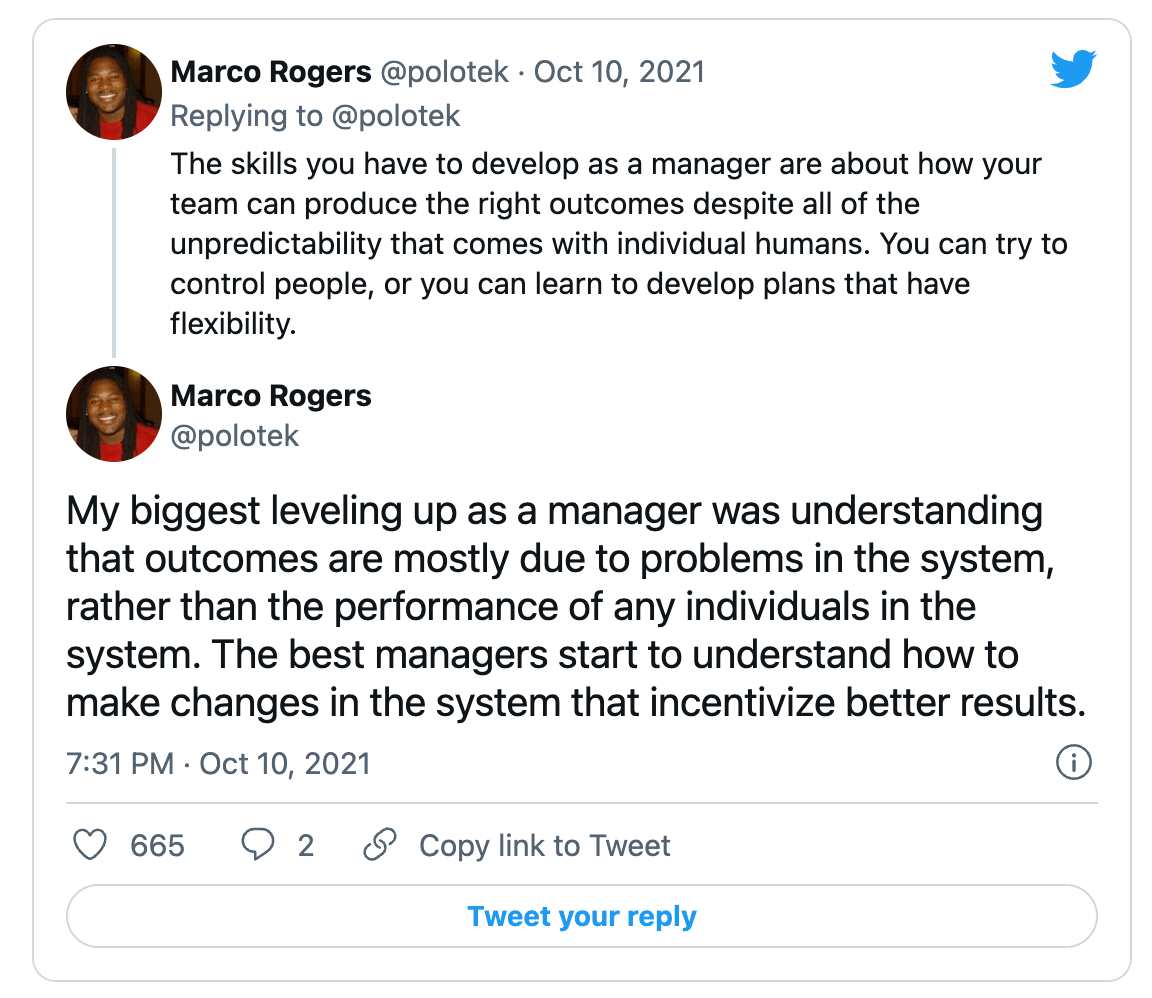
Burnout hits managers differently
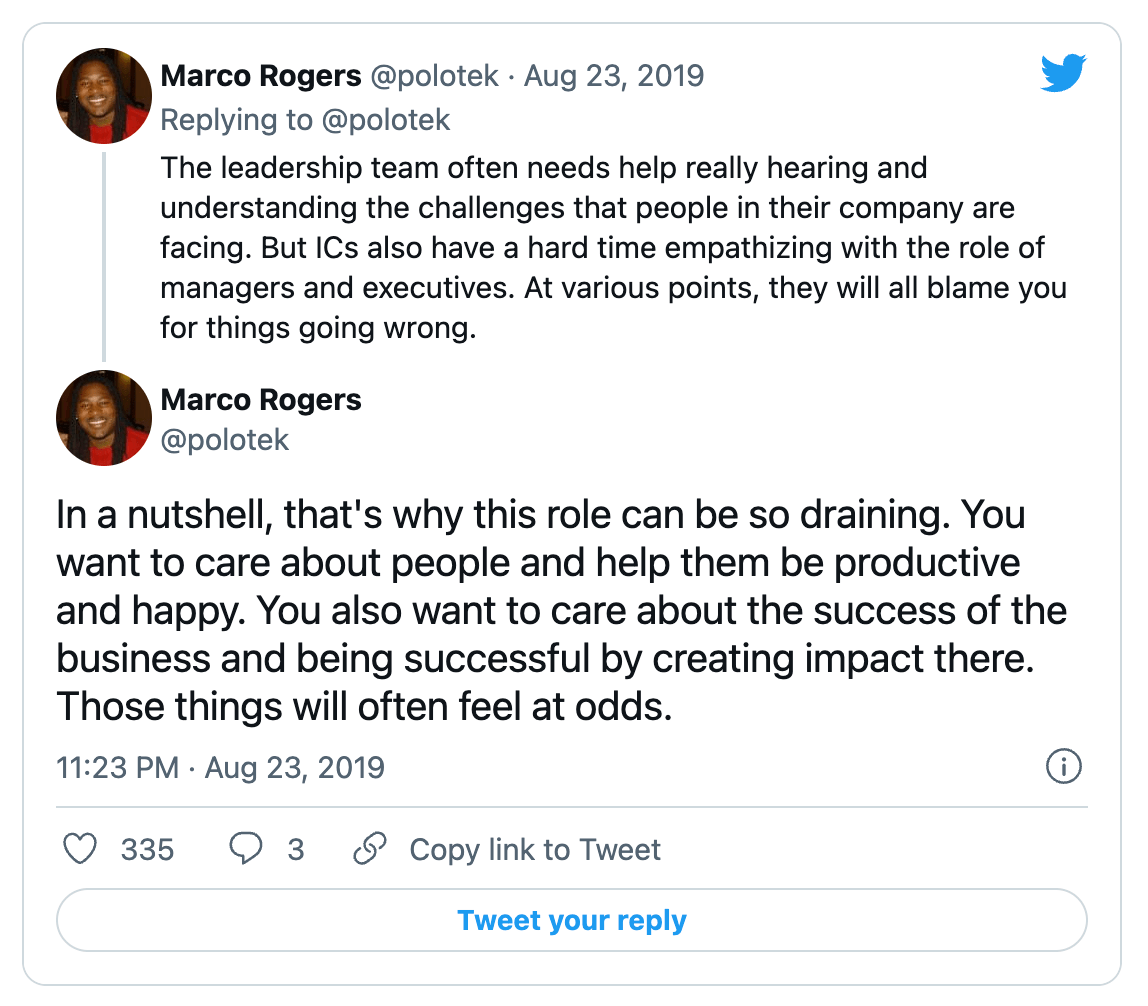
Getting people involved in management is hard.
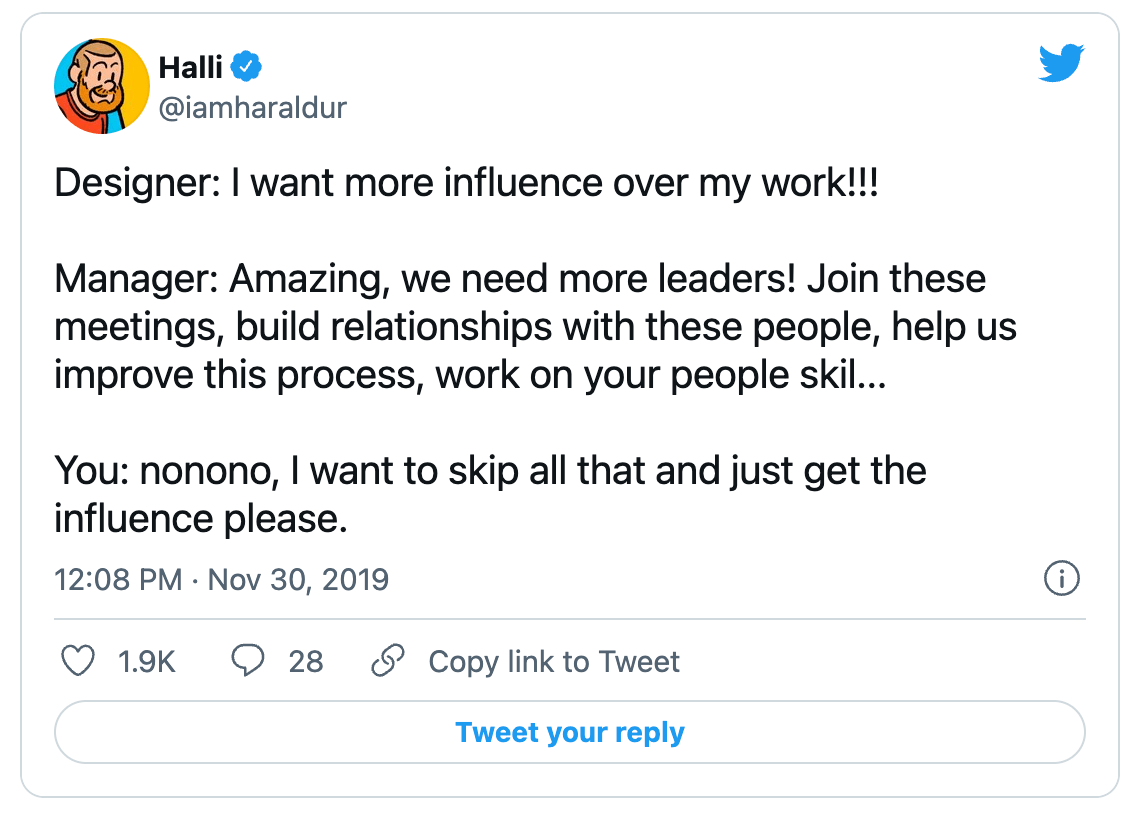
(note: Hiring managers is also hard!)
